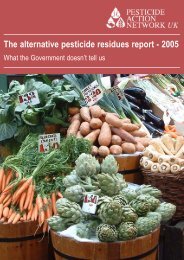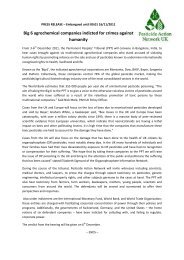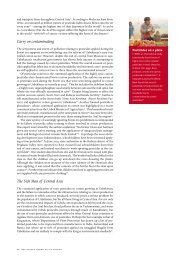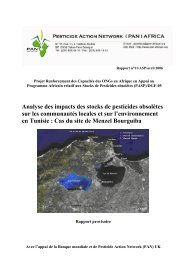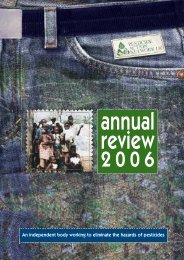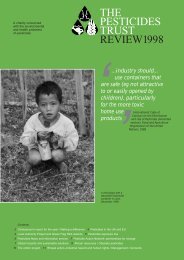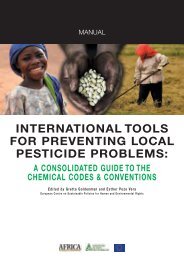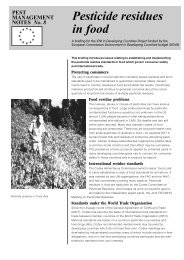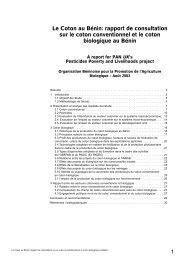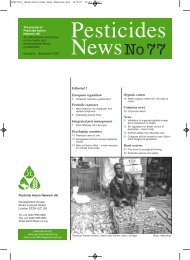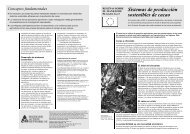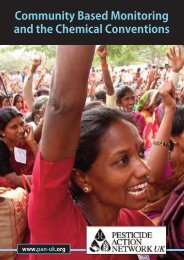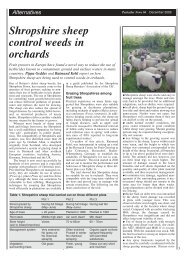Tanzania Multi Stakeholder Map - WebNG
Tanzania Multi Stakeholder Map - WebNG
Tanzania Multi Stakeholder Map - WebNG
Create successful ePaper yourself
Turn your PDF publications into a flip-book with our unique Google optimized e-Paper software.
ing them together into dialogue and action so as to assist the effective<br />
implementation of the chemical conventions and processes in <strong>Tanzania</strong>. This will<br />
help to integrate an environmental dimension into national development priorities<br />
and promote sustainable livelihoods in rural areas.<br />
The project specific objectives are to assist and support the <strong>Tanzania</strong><br />
government in implementing initiatives for local action (on environment and<br />
livelihood priorities) that enhances national regulations, synergism and share<br />
experiences nationally and internationally. Strengthen national regulatory<br />
environments and create new opportunities for collaboration between NGOs and<br />
government and other stakeholders to address the detrimental effects of<br />
hazardous pesticides. Raise awareness of the relevance of local application of<br />
international initiatives within the NGO community and civil society and<br />
demonstrate where sustainable alternatives are available and appropriate to<br />
reduce dependence on hazardous pesticides<br />
He highlighted that the project partners are Pesticide Action Network UK (PAN<br />
UK) which is the overall project coordinator, Pesticide Action Network Africa<br />
(PAN Africa) will provide information on outreach and NGO activities and also<br />
play the role of project coordinator in Africa and Pesticide Action Network Asia<br />
and the Pacific (PAN AP) will facilitate training in <strong>Tanzania</strong> on the implementation<br />
of community monitoring, provide community monitoring manual and tool kits and<br />
will provide training of trainers. Other partners of the project are Environmental<br />
Impact Ecologists from the Natural Resources Institute of the University of<br />
Greenwich, EcoSphere Law firm- based in Brussels and NGO partners in<br />
Ethiopia, Benin and Cameroon will participate in specific project activities.<br />
Mr Abdul further mentioned that the project target groups include NGOs, policy<br />
makers, pesticides regulators and customers, research institutions and<br />
academia, industries and media. He pointed out that the project activities are<br />
building multi-stakeholder involvement; community monitoring of health hazards;<br />
Eco-toxicological Monitoring - Documenting and communicating environmental<br />
impacts; African Stockpiles Programme – Opportunities and actions;<br />
Development of the Consolidated guide and checklist for implementation of<br />
conventions; Conducting Case Studies: to document gaps between regulation<br />
and the field – risk and mitigation; Integrated Pest Management - organise field<br />
visits for policy makers to demonstrate the benefits and appropriateness of<br />
sustainable strategies; and Communicating results- communication strategy.<br />
After the presentation, participants commended organisations for initiating this<br />
project. It was noted that the project had been designed such that it involves a<br />
range of different stakeholders. One participant noted further that one of the<br />
project activities is on ecotoxicological monitoring is similar to ecotoxicological<br />
training which is scheduled to take place in Zanzibar between 21 st Nov and 2 nd<br />
December 2005 organised by WIOMSA. He queried whether the organisers of<br />
5




